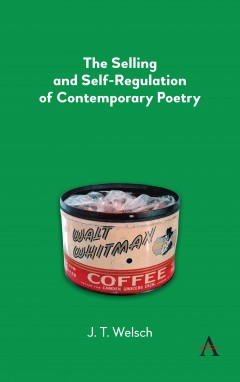The Selling and Self-Regulation of Contemporary Poetry
By J.T. Welsch
Other Formats Available:
- About This Book
- Reviews
- Author Information
- Series
- Table of Contents
- Links
- Podcasts
About This Book
The Selling and Self-Regulation of Contemporary Poetry is the first book-length study of the contemporary poetry industry. By documenting radical changes over the past decade in the way poems are published, sold, and consumed, it connects the seemingly small world of poetry with the other, wider creative industries. In reassessing an art form that has been traditionally seen as free from or even resistant to material concerns, the book confronts the real pressures – and real opportunities – faced by poets and publishers in the wake of economic and cultural shifts since 2008. The changing role of anthologies, prizes, and publishers are considered alongside new technologies, new arts policy, and re-conceptions of poetic labour.
The historical frame helps to understand the legacy of increased funding in the UK in the previous decade, which Tony Blair described as a ‘golden age’ for the arts two months before his resignation, and a year before the global financial crisis which succeeding governments used to justify major funding cuts. With this economic emphasis, the book challenges the historical perception of poetry’s market autonomy, for a period in which it has moved beyond Pierre Bourdieu’s view of it as ‘the disinterested activity par excellence’. Drawing on an emerging body of research into the newly defined creative economy, alongside materialist and sociological approaches, the book is structured around a range of case studies – from new publishing formats, new degree programmes and mentorship schemes, plagiarism scandals, to poems going ‘viral’ – emphasizing an underlying shift towards professionalisation and entrepreneurial rhetoric associated with new poetry. Ultimately, it argues that poetry’s continued growth and diversification also leaves individuals with more responsibility than ever for sustaining its communities.
Reviews
‘“Money is a kind of poetry,” said Wallace Stevens, and J. T. Welsch keeps a weather eye on both in the age of “creative” as a job description. Anyone interested in modern poetry will find this valuable study shrewd and illuminating in the way it opens the present moment to reimagining.’ —Jeremy Noel-Tod, Senior Lecturer in Literature and Creative Writing, University of East Anglia, UK
‘During the last decade, in a challenging period for many art forms, audiences for poetry have grown and the public profile of the art form increased. J. T. Welsch proposes that poetry’s fluid self-regulation is a great, and perhaps unique strength in the post-financial crash era where public austerity reigns and a growing definition of the arts as part of the “creative industries” both present challenges to the sector. Welsch makes a strong case for how poetry has moved with mainstream technology, changing definitions of the art form from within and moving with public taste whilst also remaining true to itself. An important and fascinating exploration of the life blood of poetry and how it has thrived, even in the toughest of climates.’ —Claire Malcolm, Chief Executive, New Writing North
Author Information
J. T. Welsch is a writer and critic, and a lecturer in english and creative industries at the University of York.
Series
Table of Contents
Introduction – An Essential Industry: PoBiz in the New Millennium; Part I: New Markets; 1. The Generation Game: Anthologising the New Consensus; 2. Shortlisted Against My Ruins: Scandals in the New Prize Culture; 3. Poetry as Content: The Network Value of Lyrical Thought; Part II: New Products; 4. Full-Length: The Rise & Reification of the Modern Poetry Collection; 5. Poetic Devices: Book Technologies of a Retro-Future; 6. The Big Debut; Part III: New Policy; 7. Creative Capital: The Consolidation of London’s Poetry Power; 8. Plagiarism Police and the Re-Conception of Originality; 9. Practice-Based Priorities: Studying Poetry Across the Creative-Critical Divide; Part IV: New Producers; 10. Poetry & Work: Some Thoughts on Paterson; 11. Delighted & Humbled: The Poet as Entrepreneur; 12. The Promise of Professionalism; Conclusion – The Poetry Game: Markets & Metrics of Anxiety; Index.
Links
Stay Updated
Information
Latest Tweets



